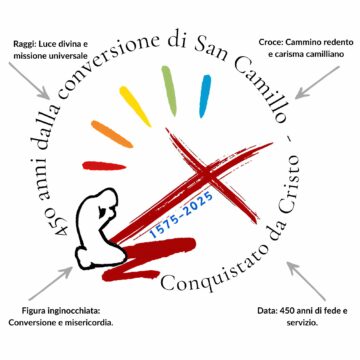 By Arnaldo Pangrazzi, from Presbyteri. Rivista di spiritualità pastorale, QS Editrice
By Arnaldo Pangrazzi, from Presbyteri. Rivista di spiritualità pastorale, QS Editrice
We are small but precious pieces in an immense mystery that envelops the world and human history. Every person – in their own way – is called to reflect the great mystery that is at the origins of every individual thing, to spread that Love that sustains life and is the principle of fertility in every one of God’s creatures. The vocation of a priest is written into a great project of love: “You did not choose me, I chose you” (Jn 15:16); a priest is called to be a generator of that love that dwells in him: ‘God is love, and whoever remains in love remains in God and God in him’ (1Jn 4:16). Hans Urs von Balthasar wrote: ‘What you are is God’s gift to you. What you become is your gift to God’. The priestly ministry is an ever-new opportunity to spread the gospel of charity through daily exchanges with brethren in the presbytery, the members of the parish and people encountered on the ways of the world. A priest performs his mission guided by the Holy Spirit and by a healthy existential realism that makes him aware that every human context is inhabited by his potentialities and those of other people, by his weaknesses and by those of other people, and by the inevitable tensions and conflicts that exist between people.
The Vocation to Love
‘My vocation is love’, wrote St. Thérèse of Lisieux: a profound insight that becomes a mission for every follower of Christ, in particular for a presbyter who is called to proclaim the gospel of nearness of God through the traditional ministries that he celebrates and interprets, that is to say leitourgia or worship, diakonia or service, kerigma or proclaiming, and koinonia or the spirit of communion.
A pastor of souls is a special reflection of the nearness of God in his way of approaching and relating to the people who are entrusted to him in the parish context; in the catechetic context of schools; in his role as comforter of the sick, the disabled and the elderly; and in his relationships with young people, couples and families – in a few words to anyone who needs human and spiritual support.
The quality of relationships is at the centre of his apostolate, just as he also represents the essence of the gospel. To the scholar of the law who asked him what he had to do to gain eternal life, Jesus answered: “You shall love the Lord, your God, with all your heart, with all your being, with all your strength, and with all your mind, and your neighbour as yourself” (Lk 10:26-27).
Living Christian and priestly fullness involves practising the three pathways of love: loving God (its transcendental or vertical expression); loving one’s neighbour (the horizontal commitment, including people and the creation); and loving oneself (the interior pathway of self-acceptance).
The way of loving God/one’s neighbour/oneself is defined in the following way: with all of one’s heart – the affective dimension; with all of one’s soul – the spiritual  dimension; with all of one’s strength – the physical/behavioural dimension; and with all of one’s mind – the cognitive dimension.
dimension; with all of one’s strength – the physical/behavioural dimension; and with all of one’s mind – the cognitive dimension.
The maturity of a priest involves an operational integration of these three relational horizons together with the dynamic integration of holistic components in giving and receiving affective nourishment.
It follows from this, that whoever does not engage in dialogue or does not communicate with his people, whoever does not have friends or tends to isolate himself, in the end loves neither God nor men, and not even himself.
When examining the three relational horizons cited above, the point of departure could be specifically the challenge of loving oneself, inasmuch as whoever is in exile inside themselves has difficulty in relating to others and could feel alienated from, or forgotten by, God. Some time ago, I do not remember clearly where, I read this sentence: ‘I looked for my God and my neighbour but I did not manage to find either of them. I then looked for myself and there I found all three’. Genesis reminds us that we are made in the image and likeness of God, as a result of which every person is a steward of the divine presence and allied in a large number of ways to other human beings.
Helping Ourselves before Taking Care of Others
Let us begin, therefore, with the first challenge, which is to learn to love ourselves, to take good care of ourselves. One begins with the assumption that if one is not well within, radiating light and hope to others will be problematic. One the other hand, a person who has a positive relationship with themselves, based upon a healthy self-esteem that creatively integrates the sharing of their possessions with reconciliation with their own weakness, is facilitated in forming good relationships with other people.
The process of internal maturation is fostered by carious factors, amongst which we find: the family and religious upbringing that has been received; humility in knowing how to remove the spines of one’s own character; the help of the human sciences, in particular psychology and anthropology; the acceptance of constructive criticism for one’s own improvement; the benefit of spiritual direction; attending courses of ongoing formation, and so forth.
 The project of growth involves, in primis, the art of ‘being men’ before ‘being priests’. Otherwise, the risk is that one’s own ministerial identity will be based upon roles that are performed (celebrant, educator, parish priest, confessor, preacher, animator, administrator and so forth) to the detriment of substance.
The project of growth involves, in primis, the art of ‘being men’ before ‘being priests’. Otherwise, the risk is that one’s own ministerial identity will be based upon roles that are performed (celebrant, educator, parish priest, confessor, preacher, animator, administrator and so forth) to the detriment of substance.
Many men of God are entangled in the thousand tasks that they have to perform and neglect relationships that should be cultivated, or they concentrate on power that has to be safeguarded and not service that must be provided. In various ecclesial contexts, defections from the Church have increased because of religious leadership that is too arrogant, overly bound to the rules, unable to delegate or involve, inclined to complaining and criticising or lacking in affectivity. In the shadow of these attitudes is often concealed a lack of self-acceptance that is unconsciously transformed into attitudes that are critical or acidic towards others.
At times, the representatives of God express malaise or obstructions in cultivating affective relationships. This takes place for various reasons: there are those who do not feel loved or valued; there are those who prefer to seek refuge in the castle of their own abstract mental convictions or limiting religious beliefs; and there are those who fear entering the fray, perhaps so as not to run the risk of being loved or loving. In some circumstance, a defensive and at times repressive formation has contributed to killing the affective potentialities of a priest who erects barriers in his relationships with other people who may see him as bad-tempered, detached and incapable of open and affectionate relationships. Certainly character, in addition to family and religious formation, plays its part, but on both these fronts one can intervene to modify and improve traits, as long as the individual concerned is motivated and ready to work on himself in order to relate in a better way to other people.
Conforming Oneself to Jesus
Today, more than in the past, the credibility of the Church depends on the humanity of priests, who, indeed, are called to conform themselves to Jesus: ‘For by His  incarnation the Son of God has united Himself in some fashion with every man. He worked with human hands, He thought with a human mind, acted by human choice and loved with a human heart’ (GS n. 22). The first ingredient in conforming himself to Jesus is the human formation of a priest, as Pope John Paul II emphasised in Pastores dabo vobis.
incarnation the Son of God has united Himself in some fashion with every man. He worked with human hands, He thought with a human mind, acted by human choice and loved with a human heart’ (GS n. 22). The first ingredient in conforming himself to Jesus is the human formation of a priest, as Pope John Paul II emphasised in Pastores dabo vobis.
In the life of Jesus it does not emerge that he lived his celibacy with suffering; he lived it, rather, with peace of mind and in a harmonious way, in a project of universal salvific relationships. Living his celibacy does not make a priest frigid – it makes him relational; it does not extinguish his passions and emotions but, instead, makes him free to love God and his brethren with an undivided heart, thereby ‘making him able to live the reality of his own body and affectivity within the logic of gift’ (The Congregation for the Clergy, The Gift of the Priestly Vocation, n. 110). In order to interact in a better way with the human documents that he encounters every day, the pastor of a flock is invited to bring into the light the ‘female’ component that he bears within him so that he becomes warmth and tenderness in his apostolate.
Salutary and providential contacts supported with the figure of the mother and other female figures are beneficial influences in educating the heart of a priest in the development of productive and healing relationships. Furthermore, the deepest contact with his own humanity often blossoms in the shadow of wounds whose scars have healed – wounds that make him humble and open to his neighbour. A priest is a wounded man amongst the wounded people that he accompanies. His compassion, like the compassion of the Good Samaritan, springs from what he has learned from his own wounds, from how he has reconciled himself with his own past, so as to become a ‘wounded healer’ at the side of people who need support and understanding. To summarise: good care for one’s neighbour starts from caring for oneself.
The Priest as a Man of Relationships
The evangelist John writes: ‘whoever does not love a brother whom he has seen cannot love God whom he has not seen’ (1Jn 4:20). In giving himself to God, a priest gives himself every day to his brothers and sisters in a constant dynamic of reciprocity, in an exchange of giving and receiving that makes his apostolate fertile.
At the centre of his activity there are relationships understood in a holistic sense, that is to say as attention that embraces the mental sphere (thoughts, reflections, knowledge…), the sphere of the heart (emotions, passions, wishes…), the sphere of behaviour (gestures, attitudes, actions…) and the spiritual sphere (values, symbols, beliefs).
Human ties take various forms and these include: the relationship between parents and children, the dynamics of communication between spouses and/or the betrothed, exchanges between friends, contacts with colleagues at work, the relationship between a teacher and their pupils, interactions with new people, and so forth.
 A priest, as a representative of God and the Church, is called to communicate with everyone: from children to the elderly, from the homeless to politicians, from widowers to the divorced, from those who are grateful for everything that they have received to those who are never satisfied with anything, from those who offer up a prayer for healing to those who are embittered because they are dying.
A priest, as a representative of God and the Church, is called to communicate with everyone: from children to the elderly, from the homeless to politicians, from widowers to the divorced, from those who are grateful for everything that they have received to those who are never satisfied with anything, from those who offer up a prayer for healing to those who are embittered because they are dying.
The mission of a priest, through the commitment to celibacy, is to give himself in a total and universal way to others through relationships with individuals, couples and communities.
His work involves radiating out that wonderful force – known as love – that can change everything. In the words of John Paul II: ‘Man cannot live without love. He remains a being that is incomprehensible for himself, his life is senseless, if love is not revealed to him, if he does not encounter love, if he does not experience it and make it his own, if he does not participate intimately in it’ (Redemptoris hominis, n. 10).
The virtues to be hoped for as regards transmitting love in a priest’s ministry are the following: sensitivity, discretion, human warmth, benevolence, emotional balance and respect for diversity.
Taking part in courses on help relationships, on counselling, on the practice of pastoral care and on psychology, together with reading and learning from people who are trained in the field, provide a formation to the pastor whereby he is an affable and loved presence at the heart of the community.
In addition to human formation, which is a fundamental requirement to enter into dialogue with people, three other capacities are proposed in order to establish more incisive and fruitful relationships: a capacity as regards relationships, a capacity as regards emotions, and a capacity as regards the spiritual. I will now set out some observations on the contents of each of these three areas:
- A capacity to deal with relationships
This is based essentially on the contents of three verbs which should be understood in a dynamic and interdependent way, that is to say: the art of knowing how to observe, of knowing how to listen and of knowing how to respond.
The first task of a priest is to learn to observe the people he is talking to. The anatomy itself of the human face (two eyes, two ears and one mouth) is a project of  communication and an invitation to invest twice the time in observing and listening and half the time in speaking. Unfortunately, many priests have a style of communication that contradicts this anatomy inasmuch as they speak too much, observe not very much, and listen to themselves and not to the other person. The body is the first means of communication and knowing how to appreciate its language (posture, contact, timbre of the voice, gestures…) is the premise for constructing incisive relationships.
communication and an invitation to invest twice the time in observing and listening and half the time in speaking. Unfortunately, many priests have a style of communication that contradicts this anatomy inasmuch as they speak too much, observe not very much, and listen to themselves and not to the other person. The body is the first means of communication and knowing how to appreciate its language (posture, contact, timbre of the voice, gestures…) is the premise for constructing incisive relationships.
Secondly, relationships require a capacity to listen, a real art that is based upon the centrality of giving to the other and knowing how to place oneself in harmony with their needs. The approaches of a priest that predispose to attentive listening include: being open and relaxed, exploring with sensitivity the thoughts and the state of mind of the interlocutor, understanding the basic issues involved, and identifying and mobilising the resources that the person has inside them.
Amongst the frequent obstacles that can interfere with listening we find: a superficiality of exchanges; impatience which leads to interrupting the other or finishing their sentences; the tendency to judge their way of thinking or forms of behaviour; and prejudice, which leads the priest not to interact in a genuine way with the interlocutor because they are placed in a category or labelled.
The third ring in the triad of communication is the art of knowing how to respond to the needs and questions of those who are talking. Many observe well but do not listen. Others observe well, listen attentively, but go against a positive result of the conversation by using responses that are banal and pre-prepared rather than entering into empathy with people. Empathy requires welcoming the thoughts and the state of mind of your neighbour, seeking to understand their point of view.
Empathy is expressed in entering, with sensitivity, the world of the needs, hopes and concerns of people, helping them to face up to their responsibilities, reassuring them where this is appropriate, educating them when this is necessary, stimulating them to identify goals to which they should direct their efforts, and opening them to God and to prayer, in order to obtain the strength to face up to the provisional character of their certainties.
To sum up: a capacity for relationships springs from the respect of the pastor for every individual that he encounters and becomes deeper in line with how much he pays attention to their individual histories, avoiding those ‘internal filters’ that can obstruct listening, such as: a tendency to impose his own values and beliefs, adopting attitudes that are judgemental or involve superiority, and abstractness in advice or hurry in exchanges.
- A capacity to deal with emotions
In recent decades, thanks above all to the contribution of the human sciences and in particular psychology, a movement has become increasingly stronger that involves a greater valuing of feelings as an important sphere of human life.
 At times, cultural influences (e.g. ‘men don’t cry’), religious influences (e.g. a connotation of sin or negativity attributed to certain feelings such as anger and sadness) or pedagogic influences (‘you should not get angry’) have caused in many pastors a loss of contact with the world of emotions and a propensity to repress it or to convert it into physical symptoms (ulcers, migraine, digestion difficulties, insomnia…) after failing to develop suitable ways of expressing it.
At times, cultural influences (e.g. ‘men don’t cry’), religious influences (e.g. a connotation of sin or negativity attributed to certain feelings such as anger and sadness) or pedagogic influences (‘you should not get angry’) have caused in many pastors a loss of contact with the world of emotions and a propensity to repress it or to convert it into physical symptoms (ulcers, migraine, digestion difficulties, insomnia…) after failing to develop suitable ways of expressing it.
Feelings have a right to citizenship because they are normal and indispensable to growth and relationships. Everybody has feelings, even if some people are not aware of them or have frozen them. Feelings can produce pleasure or pain and generate attitudes involving drawing near to or drawing way from other people. They are a precious well of information and require attention because they transmit the nature of the needs, values and hopes of people. On the one hand, they include levels of objectivity about events and relationships but, on the other, they can be the subject of distortion inasmuch as they filtered by subjective perceptions that do not necessarily reflect reality.
Beyond possible distortions, they represent, nonetheless, the most frail, delicate and profound core of a person. The attitudes that can interfere with the capacity of a priest to accompany the outpourings of those who get into contact with him are: his difficulty in recognising and understanding various emotions; a freezing of his feelings; a tendency to classify feelings into good ones and bad ones; and a facile resort to sublimation or prayer to counter them or minimise them.
One is not able to help other people, especially in the face of the critical events of our existence, if one has not learnt the art of the capacity to deal with emotions. The formation of the heart is a pastoral priority. It is indispensable for the priest to have integrated this piece into his existence in a positive way so as to be able to facilitate the working through of feelings in the experience that he encounters. His mission is to clothe himself in attitudes of readiness to help, goodness, listening and mercy, in order to transform every encounter into an opportunity for dialogue, discovery, gratitude, good spirits and comfort.
A capacity to deal with emotions requires, as Benedict XVI suggested, a ‘formation of the heart’
(Deus caritas est, n. 31) to experience the riches of humanity. People need priests who are in contact with affectivity as an important sphere of human life and who know how to manage emotions in an affirmative and productive way in order to cultivate human and humanising relationships. In general, a priest who possesses a variety of verbal, non-verbal and behavioural resources by which to communicate them lives a more intense, productive and gratifying ministry. In contrary fashion, a priest who grows rigid behind protective and defensive schemata, and neglects his heart, deprives himself of an inheritance that gives breadth and warmth to interpersonal contacts.
- A Capacity to deal with the spiritual
Thirdly, a specific dimension of the priestly ministry relates to the task that a priest has of guiding his flock in a spiritual sense, entering the life experiences of each person, where the infinite mercy of God is revealed. In parochial ministry, religious practices such as the celebrations of worship, catechesis, preaching, the formation of adults, the Christian education of children and young people, works of charity and so forth, remain at the centre of pastoral activity.
However, the spiritual horizon is not confined to religious practices, to receiving the sacraments and to adhering to the teachings of the Church. Rather, it embraces the search for meaning, the practice of the virtues, the journey in a labyrinth of fears and hopes in the face of an unfavourable diagnosis; at times an experience of emptiness or a perception of mystery; the pursuit of peace or interaction with the enigmas of existence; the experience of gratitude for graces that have been received or dismay when hopes have not been achieved.
People have a thirst for God, they look for spiritual comfort in tortuous and suffered pathways that they at times have to follow; they need someone who perceives their crises or sense of being lost and knows how to lead them towards hope or to draw upon the force of prayer and the sacraments amidst the tribulation of relationships that cause suffering or projects that have been in vain. The way in which he prays and presides over celebrations makes the priest a spiritual guide who is appreciated or not appreciated by the community.
Amongst the attitudes that obstruct the spiritual accompanying of the faithful we may list: the authoritarianism of the priest; hyperactivity or the tendency to privilege doing more than knowing how to be with people; formalism or an excess of emphasis on his role and image to the detriment of interior authenticity; and paternalism or the tendency to give easy advice rather than knowing how to live with silence as a setting for interpersonal productiveness.
In an epoch marked by a notable decrease in the clergy and vocations, we witness a percentage of priests who shine out for their dynamism and have a strong feature of making projects but who at the same time run the risk of making absolute the principle ‘by your fruits you will be known’ (Mt 7:16), attributing pastoral efficacy only to visible and tangible results. There follows from this a substantial imbalance in their approach which privileges productivity and efficiency but sacrifices the value of presence and dialogue.
Other priests may identify themselves excessively with titles, functions and clerical symbols, neglecting their own humanity. Others invoke dialogue but then practise monologues, appealing to freedom of action and decision and fleeing from possible opportunities for exchange and dialogue with other people. In their way of exercising their ministry, these priests distrust cooperation and do not take advantage of the gifts of individuals and the community.
These attitudes, produced by an excess of self-reference, impede the members of the parish from becoming living stones of the community’s edifice, conceived as a dwelling of God and not as the property of the priest.
When negative attitudes prevail what emerge are relationships that are functional more than personal, the search for control more than for fraternity, attitudes characterised more by an egocentric logic than by a spirit of communion, efforts destined to lead to fragmentation more than shared project-making.
Humility and wisdom lie in being aware of injurious and problematic forms of behaviour and rectifying them with a different mind and a different heart that are open to the multiform grace of God expressed in daily events and relationships.
Conclusion
To sum up: the more a priest attends to his humanity rather than appearances, the more he is open to dialogue and cooperation and is less directive and dogmatic, the more he is a pastor and less a manager, the more he cultivates salutary friendships and is less a prisoner of fears and distrust, the more he is capable of giving of himself through good spirits and gestures of affection and is less cold and secluded, and the more he is fragile and compassionate and less judging and rigorous, the more will his presence humanise the Church and enable people to draw nearer to God and to form communities where dialogue, nearness and mutual trust will remain.











